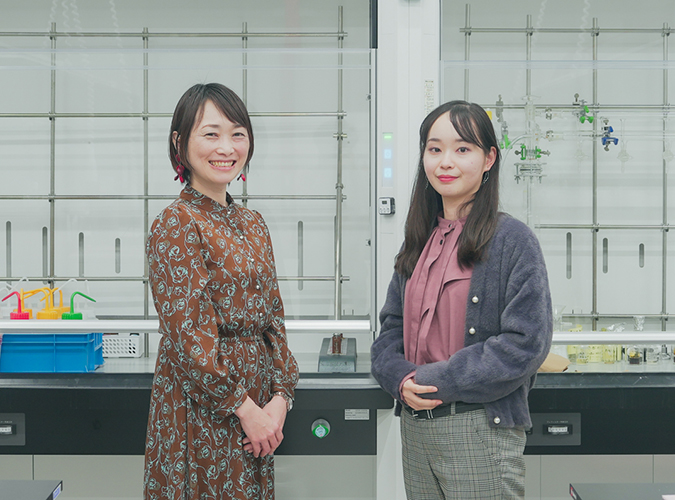世界を巡って見つけた「本当の豊かさ」を
生み出すために
経済学部卒業

OVERTURE
大学での学びのフィールドは、インターンシップや海外留学を通じて世界中に広がっています。
青山学院大学でグローバルな発想と思考を養い、世界で活躍する人材へと成長している学生・卒業生を紹介します。
「森をつくる家具」で暮らしを豊かに
私たちが仕事をすればするほど、人々の暮らしも自然環境も豊かになる。
そんなコンセプトを掲げ、家具や生活雑貨の製造・販売などを行う「ワイス・ワイス」を経営しています。オリジナルブランドの家具は全て、伐採地の森林環境や地域社会に配慮した木材であるフェアウッドを使っていて、そのうち50%以上が国内産の木材です。
今、日本の林業や製材業は、海外産の木材の影響を受けて危機的状況にあります。林業地域には、木材があり、職人がいて、加工の技術もあるのに、仕事がない。こうした地域と連携し、仕事と利益や収入を届けることが、私たちワイス・ワイスの「仕事」です。地域にお金が回れば、山林が整備され、山を健康に維持できます。いわば「森をつくる家具」をつくっているわけです。
「豊かなくらしをつくるライフスタイルブランド」を目指してワイス・ワイスを設立したのは1996年。業績は順調でしたが、次第にデフレの波に飲み込まれ、利益が上がらなくなりました。かっこよくておしゃれで、しかも安い物を。そんな同業他社との競争が続く中で、熱帯雨林で伐採された木材や、不当に安い価格で取引された木材を使った家具が出回っていること、さらに、そうした海外産の安い木材が国産の木材を追い詰めていることを知り、ショックを受けました。
それなら、日本の木を使って家具を作ろう。環境や社会を破壊するような木材を使うのはやめよう。

そう考え、2008年に産地の森林を守り、環境を考慮した企業活動を社会に約束する「グリーン・カンパニー宣言」を発表しました。
現在連携している林業地の一つ、宮城県栗原市の栗駒木材は、東日本大震災の被災地でもあります。被災後に「未来に向けた仕事を作れないか」と相談を受け、製材所の職人さんに栗駒山の杉で家具を作ってもらう事業を計画しました。構想から2年がかりで完成した家具ブランド「KURIKOMA」は、発表すると大評判に。現在は、職人さんに加えて近くの障害者施設の方にも働いていただき、新しい雇用も生まれています。
家具を使う人と、林業に携わる人や地域を繋ぎ、お互いを豊かにする会社として存在したいと考えながら、日々仕事をしています。

アメリカで無一文に。「自分づくり」の大学時代
大学時代は、「自分づくり」の期間だった気がしています。大学を卒業したら何をするのか、その先どうやって生きていくのか、ずっと探していました。さまざまなアルバイトを経験し、たくさんの人と出会いました。何か自分の人生を支えるものが見つかるんじゃないか、といろいろな場所にも出掛けました。一番大きな経験になったのが、1年間のアメリカ放浪の旅です。
大学3年の終わりに休学してアメリカに渡り、ニューヨークを出発して東海岸を南下。フロリダまでたどり着いた時、大事件が起きました。車以外の持ち物を全部盗まれてしまったんです。お金も、帰りの航空券も、その先の道中でお世話になるはずだった人の連絡先も、全部です。仕方がないので、アメリカ最南端のキーウェストで皿洗いのアルバイトをしてお金を貯め、旅を続けました。
大きなスーツケースに洋服や音楽プレーヤーを詰め込んで日本を出発したのに、持って帰ってきたものは新聞一つ。ただ、知らない土地で一文無しになっても生き残る力が自分にはある、と知ることができたのは、大きな財産になっています。
そして、旅先で出会った日本人のビジネスマンがくれた「やりたいことが決まっていないなら、興味のある分野の大きな企業に入れ」というアドバイスが、次の転機に私を導いてくれました。

「豊かさはお金ではない」。少数民族との出会いで訪れた人生の転機
人生最大の転機になったのは、インドネシアの島々で暮らす少数民族との出会いです。
大学卒業後に就職したのは、空間プロデュースなどを手掛ける業界大手の乃村工藝社。入社直後から、香港、シンガポール、マレーシアなどを転々としながら、日本の百貨店やホテルの開業プロジェクトを次々と任されました。仕事で心と体が疲弊していくのを感じて、リフレッシュするために始めたのが少数民族を巡る旅でした。
文明社会から離れた民族を知れば知るほど、「自分はいったい何をしてきたんだ」と衝撃を受けました。当時生活拠点だったシンガポールではプール付きのマンションに住み、スーツケースを片手に世界を飛び回っていながら、心身ともに疲れ果てていた自分。それに比べて、少数民族の人々は、電気も水道もない場所で、きれいな水を飲みおいしいものを食べて暮らしている。「こっちの方が豊かじゃないか?」。青天の霹靂でした。
はっきり分かったのは「豊かさに必要なのはお金ではない」ということ。お金がなくても、学校に行かなくても、たくさんの商品を買わなくても、こんなに豊かに人間は生きられるんだ、という思いに圧倒されました。
そんな時、何度も通っていたある部族の村長さんに「婿にならないか」と誘われたんです。「このままここで暮らそうかな」。そう思いながらその日は眠りにつきました。
しかし翌朝目覚めた時には、それは「違う」と思いました。この村で私だけが豊かに暮らしても、私の親や友人が幸せでなければ、きっと幸せを感じられない。この場所に私の幸せはない、とはっきり分かりました。そこでふと浮かんだのが「少数民族の暮らしから感じた『豊かさ』と向き合う仕事を、日本に帰ってする」というアイデアです。その時、私の進む道が開けたのかもしれません。
村からシンガポールに戻ると「本社勤務を命ず」という辞令が待っていました。驚きましたが、運命だったのでしょう。東京に戻って社内ベンチャーの募集に応募し、誕生したのがワイス・ワイスです。

仕事の原点は、青山学院大学で触れた社会貢献の精神
あまり「真面目に勉強した」とは言えない学生時代を送った私ですが、卒業して30年経った今、在学中に触れた「世のため人のために」という教えや、青山学院に脈々と流れる社会貢献や奉仕の精神は、知らず知らずのうちに自分にも受け継がれていると感じています。青山キャンパスの用地購入のために私財を投じたジョン・F・ガウチャー、卒業生である勝田銀次郎や間島弟彦など、多くの献身的な人々に支えられてきました。学生時代に耳にした先人たちの行いが、ずっと頭の片隅に残り、時間をかけて今の私の仕事に結びついているのだと思っています。
豊かさに必要なのはお金だけではない、とお話しましたが、モノだけでもありません。旅行、音楽、アート、食べること―。人生を豊かにするアイテムはたくさんあります。今は、家具や雑貨というモノを提供していますが、それだけでは志したことの十分の一程度。豊かな暮らしを届けるために、これからチャレンジしたいことはたくさんあります。起業して22年が経ちましたが、まだ始まったばかりという感覚です。
学生のみなさんには、自分の夢と希望のために生きてほしいと思っています。時代や社会のせいにして、挑戦する前から諦めないでほしい。一度失敗しても諦めず、作戦を立て直して4回5回と挑戦してみてください。諦めなければ必ず近付けます。
人々や社会の本当の豊かさのために。これからも「地の塩、世の光」のような仕事をしていきたいと思っています。

佐藤さんの1日


-
AM 6:00
起床、小学生の子どもたちと朝食作り。
前日の帰宅がどんなに遅くても、子どもたちと過ごす朝の時間を大切にしている -
AM 8:00
オフィス兼ショールーム「ワイス・ワイス表参道」に出勤
-
AM 9:30
朝礼、社員とミーティング
-
PM 0:00
表参道でランチタイム
-
PM 1:00
お客様との商談、担当しているプロジェクトのハンドリング
-
PM 6:00
営業時間終了。
社会的活動をする個人や団体にショールームを貸し出しているため、そのセミナーやミニシンポジウムに参加 -
PM 10:00
後片付けをして帰宅


インタビュー動画
卒業した学部
経済学部
青山学院大学の経済学部は、創設以来の伝統ある経済学科が理論、実証、政策、歴史など幅広い切り口から古今東西の様々な社会経済の諸問題を分析し、政策議論を行うためのカリキュラムを組んでいるのに対し、現代経済デザイン学科は公共、地域、地理、そしてそれぞれをサポートする地理情報システム(GIS)を現代の諸問題に応用するカリキュラムを組んでいます。




















































































































































































































































































































































































